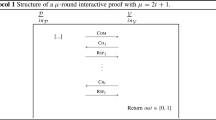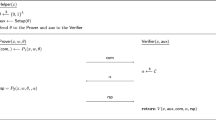Abstract
Zero-knowledge proofs of knowledge are useful tools to design signature schemes. The ongoing effort to build a quantum computer urges the cryptography community to develop new secure cryptographic protocols based on quantum-hard cryptographic problems. One of the few directions is code-based cryptography for which the strongest problem is the syndrome decoding (SD) for random linear codes. This problem is known to be NP-hard and the cryptanalysis state of the art has been stable for many years. A zero-knowledge protocol for this problem was pioneered by Stern in 1993. Since its publication, many articles proposed optimizations, implementation, or variants.
In this paper, we introduce a new zero-knowledge proof for the syndrome decoding problem on random linear codes. Instead of using permutations like most of the existing protocols, we rely on the MPC-in-the-head paradigm in which we reduce the task of proving the low Hamming weight of the SD solution to proving some relations between specific polynomials. Specifically, we propose a 5-round zero-knowledge protocol that proves the knowledge of a vector x such that \(y=Hx\) and \({\text {wt}}(x)\le w\) and which achieves a soundness error closed to 1/N for an arbitrary N.
While turning this protocol into a signature scheme, we achieve a signature size of 11–12 KB for 128-bit security when relying on the hardness of the SD problem on binary fields. Using larger fields (like \(\mathbb {F}_{2^8}\)), we can produce fast signatures of around 8 KB. This allows us to outperform Picnic3 and to be competitive with SPHINCS+, both post-quantum signature candidates in the ongoing NIST standardization effort. Moreover, our scheme outperforms all the existing code-based signature schemes for the common “signature size \(+\) public key size” metric.
Access this chapter
Tax calculation will be finalised at checkout
Purchases are for personal use only
Similar content being viewed by others
Notes
- 1.
More cryptanalysis of the SD problem over \(\mathbb {F}_{256}\) would be welcome to get more confidence in the choice of the parameters. Such research is out of the scope of present article.
- 2.
References
Abdalla, M., An, J.H., Bellare, M., Namprempre, C.: From identification to signatures via the Fiat-Shamir transform: minimizing assumptions for security and forward-security. In: Knudsen, L.R. (ed.) EUROCRYPT 2002. LNCS, vol. 2332, pp. 418–433. Springer, Heidelberg (2002). https://doi.org/10.1007/3-540-46035-7_28
Aragon, N., Blazy, O., Gaborit, P., Hauteville, A., Zémor, G.: Durandal: a rank metric based signature scheme. In: Ishai, Y., Rijmen, V. (eds.) EUROCRYPT 2019, Part III. LNCS, vol. 11478, pp. 728–758. Springer, Cham (2019). https://doi.org/10.1007/978-3-030-17659-4_25
El Yousfi Alaoui, S.M., Cayrel, P.-L., El Bansarkhani, R., Hoffmann, G.: Code-based identification and signature schemes in software. In: Cuzzocrea, A., Kittl, C., Simos, D.E., Weippl, E., Xu, L. (eds.) CD-ARES 2013. LNCS, vol. 8128, pp. 122–136. Springer, Heidelberg (2013). https://doi.org/10.1007/978-3-642-40588-4_9
Augot, D., Finiasz, M., Sendrier, N.: A fast provably secure cryptographic hash function. Cryptology ePrint Archive, Report 2003/230 (2003). https://eprint.iacr.org/2003/230
Aguilar, C., Gaborit, P., Schrek, J.: A new zero-knowledge code based identification scheme with reduced communication. In: 2011 IEEE Information Theory Workshop, pp. 648–652 (2011)
Albrecht, M.R., Rechberger, C., Schneider, T., Tiessen, T., Zohner, M.: Ciphers for MPC and FHE. In: Oswald, E., Fischlin, M. (eds.) EUROCRYPT 2015, Part I. LNCS, vol. 9056, pp. 430–454. Springer, Heidelberg (2015). https://doi.org/10.1007/978-3-662-46800-5_17
Baldi, M., Barenghi, A., Chiaraluce, F., Pelosi, G., Santini, P.: A finite regime analysis of information set decoding algorithms. Algorithms 12(10), 209 (2019)
Barenghi, A., Biasse, J.-F., Persichetti, E., Santini, P.: LESS-FM: fine-tuning signatures from the code equivalence problem. In: Cheon, J.H., Tillich, J.-P. (eds.) PQCrypto 2021 2021. LNCS, vol. 12841, pp. 23–43. Springer, Cham (2021). https://doi.org/10.1007/978-3-030-81293-5_2
Bai, S., et al.: Crypstals-dilithium - algorithm specifications and supporting documentation. Version 3.1, 8 February 2021 (2021). https://pq-crystals.org/dilithium/data/dilithium-specification-round3-20210208.pdf
Baum, C., de Saint Guilhem, C.D., Kales, D., Orsini, E., Scholl, P., Zaverucha, G.: Banquet: short and fast signatures from AES. In: Garay, J.A. (ed.) PKC 2021, Part I. LNCS, vol. 12710, pp. 266–297. Springer, Cham (2021). https://doi.org/10.1007/978-3-030-75245-3_11
Beaver, D.: Efficient multiparty protocols using circuit randomization. In: Feigenbaum, J. (ed.) CRYPTO 1991. LNCS, vol. 576, pp. 420–432. Springer, Heidelberg (1992). https://doi.org/10.1007/3-540-46766-1_34
Bidoux, L., Gaborit, P., Kulkarni, M., Mateu, V.: Code-based signatures from new proofs of knowledge for the syndrome decoding problem (2022)
Bernstein, D.J., Hülsing, A., Kölbl, S., Niederhagen, R., Rijneveld, J., Schwabe, P.: The SPHINCS\(^+\) signature framework. In: Cavallaro, L., Kinder, J., Wang, X., Katz, J. (eds.) ACM CCS 2019, pp. 2129–2146. ACM Press, November 2019
Biasse, J.-F., Micheli, G., Persichetti, E., Santini, P.: LESS is more: code-based signatures without syndromes. In: Nitaj, A., Youssef, A. (eds.) AFRICACRYPT 2020. LNCS, vol. 12174, pp. 45–65. Springer, Cham (2020). https://doi.org/10.1007/978-3-030-51938-4_3
Baum, C., Nof, A.: Concretely-efficient zero-knowledge arguments for arithmetic circuits and their application to lattice-based cryptography. In: Kiayias, A., Kohlweiss, M., Wallden, P., Zikas, V. (eds.) PKC 2020, Part I. LNCS, vol. 12110, pp. 495–526. Springer, Cham (2020). https://doi.org/10.1007/978-3-030-45374-9_17
Cantor, D.G.: On arithmetical algorithms over finite fields. J. Combin. Theory Ser. A 50, 285–300 (1989)
Chase, M., et al.: The picnic signature scheme - design document. Version 2.2, 14 April 2020 (2020). https://raw.githubusercontent.com/microsoft/Picnic/master/spec/design-v2.2.pdf
Chen, M.-S., Hülsing, A., Rijneveld, J., Samardjiska, S., Schwabe, P.: From 5-pass \(\cal{MQ}\)-based identification to \(\cal{MQ}\)-based signatures. In: Cheon, J.H., Takagi, T. (eds.) ASIACRYPT 2016, Part II. LNCS, vol. 10032, pp. 135–165. Springer, Heidelberg (2016). https://doi.org/10.1007/978-3-662-53890-6_5
Cayrel, P.-L., Véron, P., El Yousfi Alaoui, S.M.: A zero-knowledge identification scheme based on the Q-ary syndrome decoding problem. In: Biryukov, A., Gong, G., Stinson, D.R. (eds.) SAC 2010. LNCS, vol. 6544, pp. 171–186. Springer, Heidelberg (2011). https://doi.org/10.1007/978-3-642-19574-7_12
Damgård, I., Luo, J., Oechsner, S., Scholl, P., Simkin, M.: Compact zero-knowledge proofs of small hamming weight. In: Abdalla, M., Dahab, R. (eds.) PKC 2018, Part II. LNCS, vol. 10770, pp. 530–560. Springer, Cham (2018). https://doi.org/10.1007/978-3-319-76581-5_18
Debris-Alazard, T., Sendrier, N., Tillich, J.-P.: Wave: a new family of trapdoor one-way preimage sampleable functions based on codes. In: Galbraith, S.D., Moriai, S. (eds.) ASIACRYPT 2019, Part I. LNCS, vol. 11921, pp. 21–51. Springer, Cham (2019). https://doi.org/10.1007/978-3-030-34578-5_2
El Yousfi Alaoui, S.M., Dagdelen, Ö., Véron, P., Galindo, D., Cayrel, P.-L.: Extended security arguments for signature schemes. In: Mitrokotsa, A., Vaudenay, S. (eds.) AFRICACRYPT 2012. LNCS, vol. 7374, pp. 19–34. Springer, Heidelberg (2012). https://doi.org/10.1007/978-3-642-31410-0_2
Fouque, P.-A., et al.: Falcon: fast-fourier lattice-based compact signatures over NTRU. Version 1.2, 1 October 2020 (2020). https://falcon-sign.info/falcon.pdf
Feneuil, T., Joux, A., Rivain, M.: Shared permutation for syndrome decoding: new zero-knowledge protocol and code-based signature. Cryptology ePrint Archive, Report 2021/1576 (2021). https://eprint.iacr.org/2021/1576
Feneuil, T., Joux, A., Rivain, M.: Syndrome decoding in the head: shorter signatures from zero-knowledge proofs. Cryptology ePrint Archive, Report 2022/188 (2022). https://eprint.iacr.org/2022/188
Fiat, A., Shamir, A.: How to prove yourself: practical solutions to identification and signature problems. In: Odlyzko, A.M. (ed.) CRYPTO 1986. LNCS, vol. 263, pp. 186–194. Springer, Heidelberg (1987). https://doi.org/10.1007/3-540-47721-7_12
Gaborit, P., Girault, M.: Lightweight code-based identification and signature. In: IEEE International Symposium on Information Theory, ISIT 2007, Nice, France, 24–29 June 2007, pp. 191–195. IEEE (2007)
Gao, S., Mateer, T.: Additive fast fourier transforms over finite fields. IEEE Trans. Inf. Theory 56(12), 6265–6272 (2010)
Gueron, S., Persichetti, E., Santini, P.: Designing a practical code-based signature scheme from zero-knowledge proofs with trusted setup. Cryptography 6(1), 5 (2022)
Ishai, Y., Kushilevitz, E., Ostrovsky, R., Sahai, A.: Zero-knowledge from secure multiparty computation. In: Johnson, D.S., Feige, U. (eds.) 39th ACM STOC, pp. 21–30. ACM Press, June 2007
Kales, D., Zaverucha, G.: An attack on some signature schemes constructed from five-pass identification schemes. In: Krenn, S., Shulman, H., Vaudenay, S. (eds.) CANS 2020. LNCS, vol. 12579, pp. 3–22. Springer, Cham (2020). https://doi.org/10.1007/978-3-030-65411-5_1
Kales, D., Zaverucha, G.: Improving the performance of the Picnic signature scheme. IACR TCHES 2020(4), 154–188 (2020). https://tches.iacr.org/index.php/TCHES/article/view/8680
Kales, D., Zaverucha, G.: Efficient lifting for shorter zero-knowledge proofs and post-quantum signatures. Preliminary Draft, 29 October 2021 (2021). https://groups.google.com/a/list.nist.gov/g/pqc-forum/c/vLyUa_NFUsY/m/gNSnuhmxBQAJ
Lindell, Y., Nof, A.: A framework for constructing fast MPC over arithmetic circuits with malicious adversaries and an honest-majority. In: Thuraisingham, B.M., Evans, D., Malkin, T., Xu, D. (eds.) ACM CCS 2017, pp. 259–276. ACM Press, October/November 2017
May, A., Meurer, A., Thomae, E.: Decoding random linear codes in \(\tilde{\cal{O}}(2^{0.054n})\). In: Lee, D.H., Wang, X. (eds.) ASIACRYPT 2011. LNCS, vol. 7073, pp. 107–124. Springer, Heidelberg (2011). https://doi.org/10.1007/978-3-642-25385-0_6
Stern, J.: A new identification scheme based on syndrome decoding. In: Stinson, D.R. (ed.) CRYPTO 1993. LNCS, vol. 773, pp. 13–21. Springer, Heidelberg (1994). https://doi.org/10.1007/3-540-48329-2_2
Canto Torres, R., Sendrier, N.: Analysis of information set decoding for a sub-linear error weight. In: Takagi, T. (ed.) PQCrypto 2016. LNCS, vol. 9606, pp. 144–161. Springer, Cham (2016). https://doi.org/10.1007/978-3-319-29360-8_10
Véron, P.: Improved identification schemes based on error-correcting codes. Appl. Algebra Eng. Commun. Comput. 8(1), 57–69 (1996)
von zur Gathen, J., Gerhard, J.: Modern Computer Algebra. Cambridge University Press, Cambridge (2003)
Wang, Y., Zhu, X.: A fast algorithm for the Fourier transform over finite fields and its VLSI implementation. IEEE J. Sel. Areas Commun. 6(3), 572–577 (1988)
Acknowledgements
This work has been supported by the European Union’s H2020 Programme under grant agreement number ERC-669891.
Author information
Authors and Affiliations
Corresponding author
Editor information
Editors and Affiliations
Rights and permissions
Copyright information
© 2022 International Association for Cryptologic Research
About this paper
Cite this paper
Feneuil, T., Joux, A., Rivain, M. (2022). Syndrome Decoding in the Head: Shorter Signatures from Zero-Knowledge Proofs. In: Dodis, Y., Shrimpton, T. (eds) Advances in Cryptology – CRYPTO 2022. CRYPTO 2022. Lecture Notes in Computer Science, vol 13508. Springer, Cham. https://doi.org/10.1007/978-3-031-15979-4_19
Download citation
DOI: https://doi.org/10.1007/978-3-031-15979-4_19
Published:
Publisher Name: Springer, Cham
Print ISBN: 978-3-031-15978-7
Online ISBN: 978-3-031-15979-4
eBook Packages: Computer ScienceComputer Science (R0)





